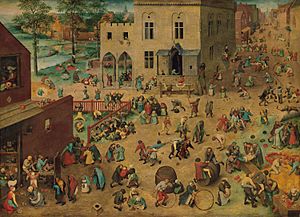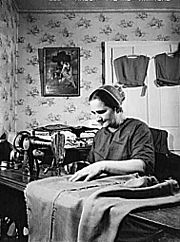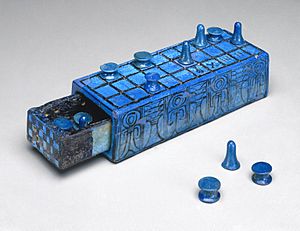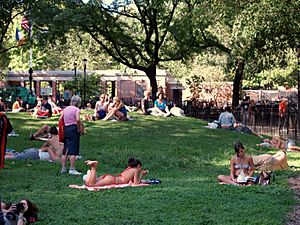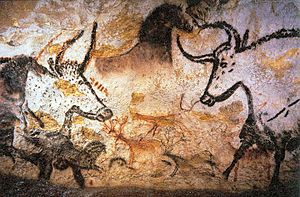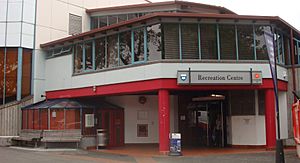Recreation facts for kids
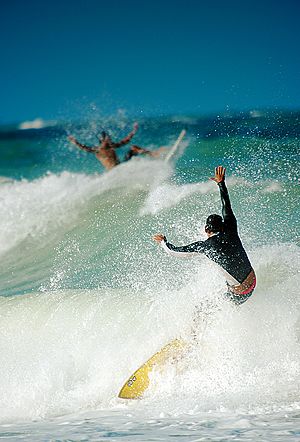
Recreation means doing activities just for fun and enjoyment. It's about using your free time to do things you love. This need to play and relax is a very important part of being human. Recreational activities make us happy, amused, and give us pleasure. They are all about having a good time!
The word recreation first appeared in English around the late 1300s. It originally meant "to refresh" or "to heal" someone who was sick. It comes from Latin words: re (meaning "again") and creare (meaning "to create" or "to make"). So, recreation is like "re-creating" yourself!
Contents
What is Free Time?
People spend their time on daily tasks, work, sleep, and social duties. The time left over, when you don't have other commitments, is called leisure or free time. This free time is needed for recreation.
Over the years, people have gained more free time. This is partly because people live longer and many spend fewer hours working for basic survival. However, some people feel they have less free time today because they are busy with many tasks. Other reasons for more recreation include having more money and more options for fun activities.
Some people think free time is just "spare time" not used for necessities. Others believe free time helps us think about important values and ideas we might miss in daily life. It's seen as a key part of personal growth. Some even say that free time is the main reason we work, and it's a reward in itself. The way a country uses its free time can show its values. Free time is even considered a human right!
Play, Fun, and Work
It's hard to separate recreation from play. Play is usually the word we use for children's fun activities. Kids often play by pretending to do adult tasks.
Some believe that play and recreation help us use up extra energy. They let us do fun things that are good for us and for society, without being forced. These activities bring satisfaction and joy. A common idea is that recreation helps us "recharge" so we can work better.
Work is usually done because we need money, and it's useful for society. But work can also be enjoyable and something we choose to do. This can make it hard to tell the difference between work and recreation. For example, a musician might play an instrument for their job, but also for fun in their free time.
It can also be hard to tell the difference between learning and recreation. Think about recreational mathematics, where you learn math through fun puzzles and games.
How Recreation Helps Your Health
Recreation has many health benefits! Because of this, a field called Therapeutic Recreation has developed. Professionals in this field are called "Certified Therapeutic Recreation Specialists." They use recreation to help people get better.
This therapy is used in many places, like:
- Rehabilitation centers
- Mental health facilities for young people and adults
- Care for the elderly, disabled, or people with long-term illnesses
Being physically active through recreation helps reduce obesity (being very overweight). It also lowers the risk of weak bones (osteoporosis) and some types of cancer. However, some outdoor activities might slightly increase the risk of melanoma, a type of skin cancer. Also, very exciting or risky activities, like adventure recreation, have their own dangers.
Types of Fun Activities
Recreation is a key part of human life and comes in many forms. These forms are shaped by what each person likes and by the society they live in. Recreational activities can be:
- Done with others or alone
- Active or quiet
- Outdoors or indoors
- Healthy or harmful
- Good for society or bad
Some activities, like gambling or breaking rules, might go against what society expects. There are almost endless types of recreational activities!
Hobbies
A big part of recreation involves hobbies. A hobby is a regular activity you do for enjoyment, usually in your free time, not for money. Hobbies can include:
- collecting things
- Doing creative and artistic projects
- Playing sports
- Other fun pastimes
Hobbies help you gain skills and knowledge in that area. The list of hobbies changes as new interests and trends appear. For example, stamp collecting was popular when postal systems were the main way to communicate. Now, video games are more popular because of new technology. As technology and production improved in the 1800s, workers had more free time for hobbies. This led to more people getting involved in hobbies over time.
DIY and Making Things
Bricolage and DIY (Do It Yourself) are terms for building, changing, or fixing things without professional help. This can involve using raw materials to create or fix items, even from nature (like gardening). People do DIY for different reasons:
- Money: To save money or because a product isn't available or good enough.
- Customization: To make something exactly how they want it.
- Identity: To show their skill, feel powerful, connect with others, or create something unique.
DIY can involve crafts that need special skills. The "maker culture" enjoys things like home improvement, electronics, robotics, 3D printing, and using computer-controlled tools. They also enjoy traditional activities like metalworking, woodworking, and arts and crafts. This group likes to share designs online and learn practical skills.
Games
Any structured form of play can become a game. Games are played for fun, but sometimes also for winning or money. They can be played alone, in teams, or online. Amateurs play for fun, while professionals might play as part of their job to entertain others. Games can be board games, puzzles, computer games, or video games.
Outdoor Fun
Outdoor recreation happens outside, usually in nature. Activities like fishing, hunting, backpacking, and horseback riding depend on the environment. While many are sports, you don't have to be an athlete to do them. Competition is usually less important than in team sports. When an activity is very exciting, physically challenging, or risky, it's sometimes called "adventure recreation" instead of an extreme sport.
Other common outdoor activities include hiking, camping, mountaineering, cycling, canoeing, caving, kayaking, rafting, rock climbing, running, sailing, skiing, sky diving, and surfing. New activities are always appearing, often combining older ones, like coasteering (exploring coastlines) or plogging (picking up litter while jogging).
Performing Arts
Dance
Dance is a great way to have fun, socialize, and get exercise. Whether it's a folk dance, a social dance, or a group dance like a line dance or square dance, people do it mainly for enjoyment. There are many forms of dance for all ages and cultures.
Making Music
People create and perform Music for many reasons, including recreation, religious events, or entertainment. In the past, when music was only available as sheet music, people would buy their favorite songs to play at home on their instruments.
Playing Video Games
Video games offer exciting experiences. Players can often shape some parts of the game's look and feel, while the game creators control the main story and design.
Visual Arts
Many activities in the Visual arts are done for recreation. These include:
- Woodworking
- Photography
- Moviemaking
- Jewelry making
- Software projects like Photoshopping
- Making music or video production at home
- Making bracelets
- Artistic projects like drawing and painting
- Cosplay (designing and wearing costumes based on characters)
- Creating models from paper or card stock (called papercraft)
Drawing
Drawing has been around for at least 16,000 years! Early examples are Paleolithic cave paintings of animals in places like Lascaux in France. In ancient Egypt, ink drawings on papyrus were used as guides for paintings or sculptures.
When paper became common in Europe in the 1400s, famous artists like Leonardo da Vinci used drawing as an art form itself, not just for planning paintings.
Literature
Writing can be a recreational activity, like writing letters, journals, or web blogs. In the US, about half of all adults read at least one book for fun each year. About 5% read more than 50 books a year!
Painting
Like drawing, Painting started in caves and on rocks. Some of the best examples, thought to be 32,000 years old, are in the Chauvet and Lascaux caves in France. These paintings show bison, horses, and deer in shades of red, brown, yellow, and black.
Paintings of people can be found in ancient Egyptian tombs. Greek and Roman art also influenced later art styles. Building, painting, and displaying models of airplanes, boats, cars, tanks, or even superheroes are popular hobbies.
Photography
Photography can be a hobby or a passion. An amateur photographer takes pictures for fun, not for money. Sometimes, their work can be very specialized or unique. Amateur photography is often best for subjects that don't have a commercial use.
Amateur photography became popular in the late 1800s with the invention of the Hand-held camera. Today, it's very widespread thanks to social media and mobile phones. Clear pictures can now be taken with a cell phone, making photography easy for everyone.
Organized Recreation
Many recreational activities are organized by different groups:
- Public institutions: Like the National Park Service.
- Volunteer groups: Like the YMCA.
- Private groups: Supported by membership fees, like the Kiwanis.
- Businesses: Like Walt Disney World.
Public places like parks and beaches are very important for many recreational activities. Tourism also relies on recreational offerings, as many visitors come specifically for them. Famous beach areas like Venice Beach in California or the Promenade des Anglais in Nice are key recreational spots for locals and popular tourist destinations.
Governments play a big role in creating, maintaining, and organizing recreational activities. Whole industries have grown around selling products and services for recreation. Recreation-related businesses are a major part of the economy. For example, the outdoor recreation sector alone adds $730 billion to the U.S. economy each year and creates 6.5 million jobs.
Recreation Centers
A recreation center is a place for fun activities, usually run by a city government. Common activities there include swimming, basketball, weightlifting, volleyball, and kids' play areas.
Recreation as a Job
A recreation specialist helps meet the recreational needs of a community or a specific group. Colleges offer degrees in recreation management. People with these degrees often work in parks and recreation centers, managing community projects and activities. Their jobs might include working with instructors, managing budgets, and checking how programs are doing.
In the United States, most states have professional groups for ongoing learning and certification in recreation management. The National Recreation and Park Association offers a certification called CPRP (Certified Park and Recreation Professional), which is a national standard for recreation specialists.
Online Booking for Fun
Since the early 2000s, more and more websites have appeared for booking recreational activities online. Many of these use the internet, mobile devices, and online payments to create easy booking systems. One early success was TripAdvisor, a platform for tourist activities. These platforms show that more and more people in cities around the world want recreation and entertainment.
See also
 In Spanish: Diversión para niños
In Spanish: Diversión para niños
- Adventure recreation
- Amusement
- Art
- Entertainment
- Fun
- Hobby
- Play
- Recreation area
- Recreation room
- Tourist attraction
- Work-life balance
 | John T. Biggers |
 | Thomas Blackshear |
 | Mark Bradford |
 | Beverly Buchanan |


